
A sharp political rift has emerged within Benin’s ruling coalition as Jacques Ayadji, president of the Movement of Elites Committed to the Emancipation of Benin (Moele-Bénin), openly accused senior figures of undermining his party.
Speaking at Moele-Bénin’s national headquarters in Cotonou on Thursday, 14 August, Mr Ayadji denounced what he described as “acts of poaching” orchestrated by leaders from the presidential movement.
He condemned what he called “the shameful past, the political transhumance and the underhand maneuvers” of politicians who, he argued, were deliberately targeting his party.
Among those singled out were MP Agoua Assogba Edmond, mayor of Tori-Bossito Rogatien Akwaku, and Alain Gnancadja, a political actor in the 9th electoral district.
Mr Ayadji insisted that such behaviour was incompatible with the party system reforms introduced under President Patrice Talon, reforms intended to strengthen cohesion and raise political standards.
“Moele-Benin is more attacked in the presidential movement than in the opposition,” he lamented.
The Moele-Bénin leader claimed he had already warned the head of the Progressive Union for Renewal (UPR) about these practices, but said repeated internal appeals had gone unanswered.
He accused MP Agoua Assogba Edmond of being “a finished politician” who fuelled disorder in the Collines department and even urged voters to reject Moele-Bénin during the 2023 legislative elections.
Mayor Rogatien Akwaku was criticised for recruiting a former Moele-Bénin coordinator against the wishes of President Talon, while Mr Ayadji said Alain Gnancadja’s activities at the local level also ran counter to the coalition’s spirit of collaboration.
Addressing speculation over a possible electoral compromise, Mr Ayadji firmly denied any agreement with the head of state to cancel future elections, calling the claim “a serious untruth.”
Reaffirming his party’s ambitions, he declared: “The victory of the presidential movement in 2026 depends on Moele-Benin.”



